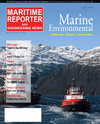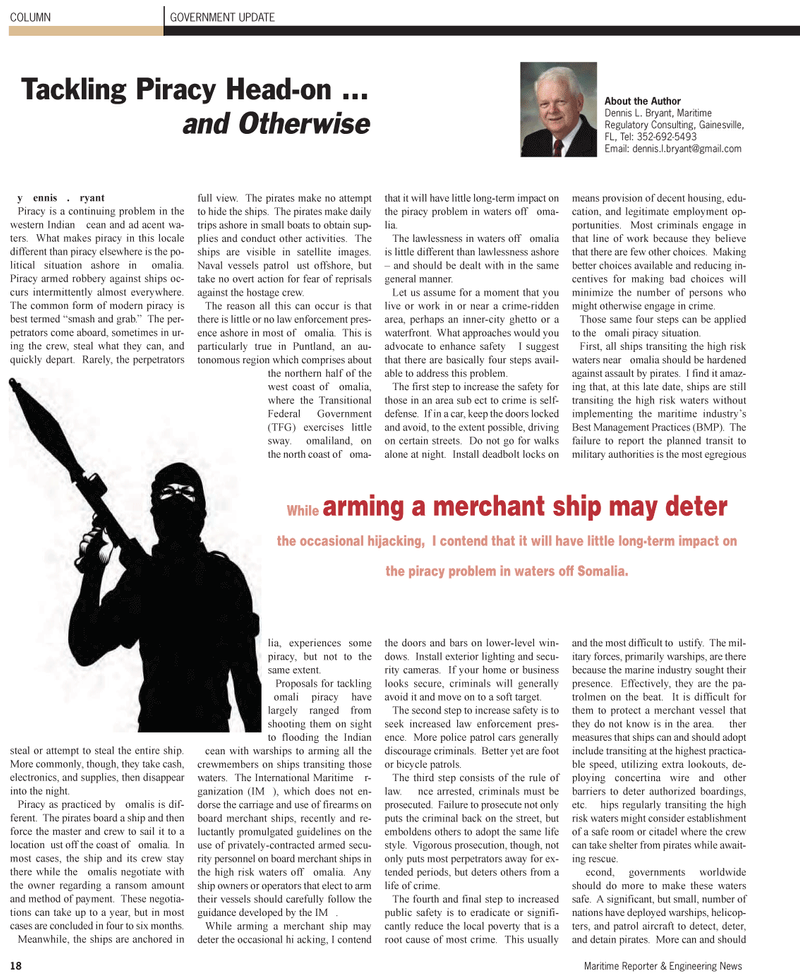
Page 18: of Maritime Reporter Magazine (July 2011)
The Green Ship Edition
Read this page in Pdf, Flash or Html5 edition of July 2011 Maritime Reporter Magazine
18Maritime Reporter & Engineering News GOVERNMENT UPDATE COLUMNTackling Piracy Head-on ... and Otherwisey ennis . ryant Piracy is a continuing problem in the western Indian cean and adacent wa- ters. What makes piracy in this locale different than piracy elsewhere is the po- litical situation ashore in omalia. Piracyarmed robbery against ships oc- curs intermittently almost everywhere. The common form of modern piracy is best termed ?smash and grab.? The per- petrators come aboard, sometimes inur- ing the crew, steal what they can, and quickly depart. Rarely, the perpetrators steal or attempt to steal the entire ship.More commonly, though, they take cash, electronics, and supplies, then disappearinto the night.Piracy as practiced by omalis is dif- ferent. The pirates board a ship and then force the master and crew to sail it to a location ust off the coast of omalia. In most cases, the ship and its crew stay there while the omalis negotiate with the owner regarding a ransom amount and method of payment. These negotia- tions can take up to a year, but in most cases are concluded in four to six months.Meanwhile, the ships are anchored infull view. The pirates make no attempt to hide the ships. The pirates make daily trips ashore in small boats to obtain sup-plies and conduct other activities. The ships are visible in satellite images.Naval vessels patrol ust offshore, but take no overt action for fear of reprisals against the hostage crew. The reason all this can occur is thatthere is little or no law enforcement pres- ence ashore in most of omalia. This is particularly true in Puntland, an au-tonomous region which comprises about the northern half of thewest coast of omalia, where the Transitional Federal Government (TFG) exercises little sway. omaliland, on the north coast of oma- lia, experiences some piracy, but not to the same extent. Proposals for tacklingomali piracy have largely ranged from shooting them on sightto flooding the Indiancean with warships to arming all the crewmembers on ships transiting those waters. The International Maritime r- ganization (IM), which does not en- dorse the carriage and use of firearms on board merchant ships, recently and re-luctantly promulgated guidelines on theuse of privately-contracted armed secu- rity personnel on board merchant ships inthe high risk waters off omalia. Any ship owners or operators that elect to arm their vessels should carefully follow the guidance developed by the IM. While arming a merchant ship maydeter the occasional hiacking, I contend that it will have little long-term impact on the piracy problem in waters off oma- lia.The lawlessness in waters off omalia is little different than lawlessness ashore ? and should be dealt with in the samegeneral manner. Let us assume for a moment that youlive or work in or near a crime-ridden area, perhaps an inner-city ghetto or a waterfront. What approaches would you advocate to enhance safety I suggest that there are basically four steps avail- able to address this problem.The first step to increase the safety for those in an area subect to crime is self- defense. If in a car, keep the doors locked and avoid, to the extent possible, driving on certain streets. Do not go for walks alone at night. Install deadbolt locks on the doors and bars on lower-level win- dows. Install exterior lighting and secu- rity cameras. If your home or business looks secure, criminals will generallyavoid it and move on to a soft target. The second step to increase safety is toseek increased law enforcement pres- ence. More police patrol cars generally discourage criminals. Better yet are foot or bicycle patrols. The third step consists of the rule oflaw. nce arrested, criminals must be prosecuted. Failure to prosecute not only puts the criminal back on the street, but emboldens others to adopt the same lifestyle. Vigorous prosecution, though, not only puts most perpetrators away for ex- tended periods, but deters others from a life of crime.The fourth and final step to increased public safety is to eradicate or signifi- cantly reduce the local poverty that is a root cause of most crime. This usually means provision of decent housing, edu- cation, and legitimate employment op- portunities. Most criminals engage in that line of work because they believe that there are few other choices. Making better choices available and reducing in- centives for making bad choices will minimize the number of persons whomight otherwise engage in crime.Those same four steps can be appliedto the omali piracy situation. First, all ships transiting the high riskwaters near omalia should be hardened against assault by pirates. I find it amaz- ing that, at this late date, ships are stilltransiting the high risk waters without implementing the maritime industry?s Best Management Practices (BMP). The failure to report the planned transit to military authorities is the most egregious and the most difficult to ustify. The mil- itary forces, primarily warships, are there because the marine industry sought theirpresence. Effectively, they are the pa- trolmen on the beat. It is difficult for them to protect a merchant vessel that they do not know is in the area. ther measures that ships can and should adoptinclude transiting at the highest practica-ble speed, utilizing extra lookouts, de- ploying concertina wire and other barriers to deter authorized boardings,etc. hips regularly transiting the high risk waters might consider establishment of a safe room or citadel where the crew can take shelter from pirates while await- ing rescue.econd, governments worldwide should do more to make these waters safe. A significant, but small, number of nations have deployed warships, helicop- ters, and patrol aircraft to detect, deter, and detain pirates. More can and should About the AuthorDennis L. Bryant, Maritime Regulatory Consulting, Gainesville,FL, Tel: 352-692-5493 Email: [email protected] arming a merchant ship may deter the occasional hijacking, I contend that it will have little long-term impact on the piracy problem in waters off Somalia.

 17
17

 19
19
